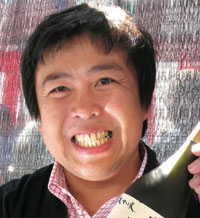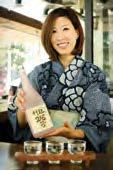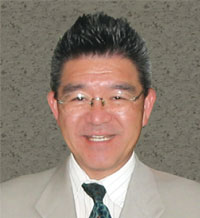Four Key Points of Selling and Developing Sake
By Yuji Matsumoto
Many of those involved in sake tend to prefer to use vague and mysterious expressions. It seems as if they dislike saying anything definitive about a product’s characteristics. However, in order to sell specific sake in a market full of many options (including wine and beer), sake makers need to have a more focused development and sales effort. This can be said about both the manufacturers and the sellers. If a sake is just “good for anyone” or “goes with everything” it just won’t stand out.
Think of it as a description of a person who wants a serious relationship with you. If you really like the person, saying “he/she is a very nice person” is simply rude.
Dealing with many consumers on a daily basis making proposals on sake, I realize that there are requisite key points. Going over these points alone makes the conversation a success. Roughly speaking, there are four points. The first is aroma. Explain the strength of the product’s aroma (gorgeous or tender) and its characteristics (fruity, floral, alcohol).
The second is body. Explain the product’s sweetness, acid taste, bitterness, and also how it goes down one’s throat.
The third is food pairing. Select the absolute best dish for it. Don’t explain too much, just say it simply: “No other sake goes better with salmon sashimi!”
The fourth is temperature. Explain which temperature setting is best for the product: room temperature, hot, or cold?
Sake manufacturers need to be aware of these points as well. Have a clear vision when developing a product, such as where your target market is, and what you want it to do. “I want my sake to pair with beef steaks like no red wines can” is a good example. And make sure you convey the message in your marketing effort.
Also make sure that these four points are mentioned in your menus, and stressed in your staff training sessions.
日本酒を売る・開発する4つのポイント
多くの日本酒に携わっている人たちは、あいまいな微妙で神秘的な表現が好きだ。商品の特徴を特定したり、断言することを嫌うように感じられる。しかし、多くの選択肢(ワイン、ビールも含めた)から特定の日本酒を選んで売るためには、ある程度特定した市場に対してその商品を開発したり、提案する必要がある。これは造り手も販売者も同じだ。万人にうける商品や何にでも合うものは、あってもいいが説得力がない。
あの人は、どいういう人、と聞かれ「とてもいい人です」では、真剣に交際をしようとしている人に失礼なのと同じだ。
多くの消費者と日々接し、日本酒について提案しているとやはりセールストークには “落としどころ” というものがある。ここのポイントだけを抑えていれば大体は納得してもらえるものというツボだ。大きく分けると大体4つに集約される。
一つ目は、香りだ。まずは強弱(華やかかおとなしい)と特徴(果実、花、アルコール臭など)を伝える。
二つ目は、ボディー。甘さ、酸味、苦味以外にドライ感などのど越しの感覚を伝える。
三つ目は、食事との相性。ここではこれなら絶対負けない一番の料理を選ぶ。あれこれ言うとポイントがぼけるので、ずばり「サーモン刺身ならうちの酒に敵うものなし!」ぐらいがいい。
四つ目は、温度帯。なぜこの酒は冷(常温)、燗、冷酒が向いているのか?を理解してもらう。
これは、販売者だけに限らず、生産者も商品を開発する際に重要な点である。しっかりとしたビジョンで開発し、これならこの市場、たとえばビーフステーキ料理ならどの赤ワインにも負けない、くらいの日本酒がほしいものだ。そしてそれを伝えるきちんとしたマーケティング資料や商品パンフレットの文面に記載するべきである。
また、この4ポイントをメニューの中に生かしたり、従業員トレーニングにも生かしていただきたい。
Many of those involved in sake tend to prefer to use vague and mysterious expressions. It seems as if they dislike saying anything definitive about a product’s characteristics. However, in order to sell specific sake in a market full of many options (including wine and beer), sake makers need to have a more focused development and sales effort. This can be said about both the manufacturers and the sellers. If a sake is just “good for anyone” or “goes with everything” it just won’t stand out.
Think of it as a description of a person who wants a serious relationship with you. If you really like the person, saying “he/she is a very nice person” is simply rude.
Dealing with many consumers on a daily basis making proposals on sake, I realize that there are requisite key points. Going over these points alone makes the conversation a success. Roughly speaking, there are four points. The first is aroma. Explain the strength of the product’s aroma (gorgeous or tender) and its characteristics (fruity, floral, alcohol).
The second is body. Explain the product’s sweetness, acid taste, bitterness, and also how it goes down one’s throat.
The third is food pairing. Select the absolute best dish for it. Don’t explain too much, just say it simply: “No other sake goes better with salmon sashimi!”
The fourth is temperature. Explain which temperature setting is best for the product: room temperature, hot, or cold?
Sake manufacturers need to be aware of these points as well. Have a clear vision when developing a product, such as where your target market is, and what you want it to do. “I want my sake to pair with beef steaks like no red wines can” is a good example. And make sure you convey the message in your marketing effort.
Also make sure that these four points are mentioned in your menus, and stressed in your staff training sessions.
日本酒を売る・開発する4つのポイント
多くの日本酒に携わっている人たちは、あいまいな微妙で神秘的な表現が好きだ。商品の特徴を特定したり、断言することを嫌うように感じられる。しかし、多くの選択肢(ワイン、ビールも含めた)から特定の日本酒を選んで売るためには、ある程度特定した市場に対してその商品を開発したり、提案する必要がある。これは造り手も販売者も同じだ。万人にうける商品や何にでも合うものは、あってもいいが説得力がない。
あの人は、どいういう人、と聞かれ「とてもいい人です」では、真剣に交際をしようとしている人に失礼なのと同じだ。
多くの消費者と日々接し、日本酒について提案しているとやはりセールストークには “落としどころ” というものがある。ここのポイントだけを抑えていれば大体は納得してもらえるものというツボだ。大きく分けると大体4つに集約される。
一つ目は、香りだ。まずは強弱(華やかかおとなしい)と特徴(果実、花、アルコール臭など)を伝える。
二つ目は、ボディー。甘さ、酸味、苦味以外にドライ感などのど越しの感覚を伝える。
三つ目は、食事との相性。ここではこれなら絶対負けない一番の料理を選ぶ。あれこれ言うとポイントがぼけるので、ずばり「サーモン刺身ならうちの酒に敵うものなし!」ぐらいがいい。
四つ目は、温度帯。なぜこの酒は冷(常温)、燗、冷酒が向いているのか?を理解してもらう。
これは、販売者だけに限らず、生産者も商品を開発する際に重要な点である。しっかりとしたビジョンで開発し、これならこの市場、たとえばビーフステーキ料理ならどの赤ワインにも負けない、くらいの日本酒がほしいものだ。そしてそれを伝えるきちんとしたマーケティング資料や商品パンフレットの文面に記載するべきである。
また、この4ポイントをメニューの中に生かしたり、従業員トレーニングにも生かしていただきたい。






